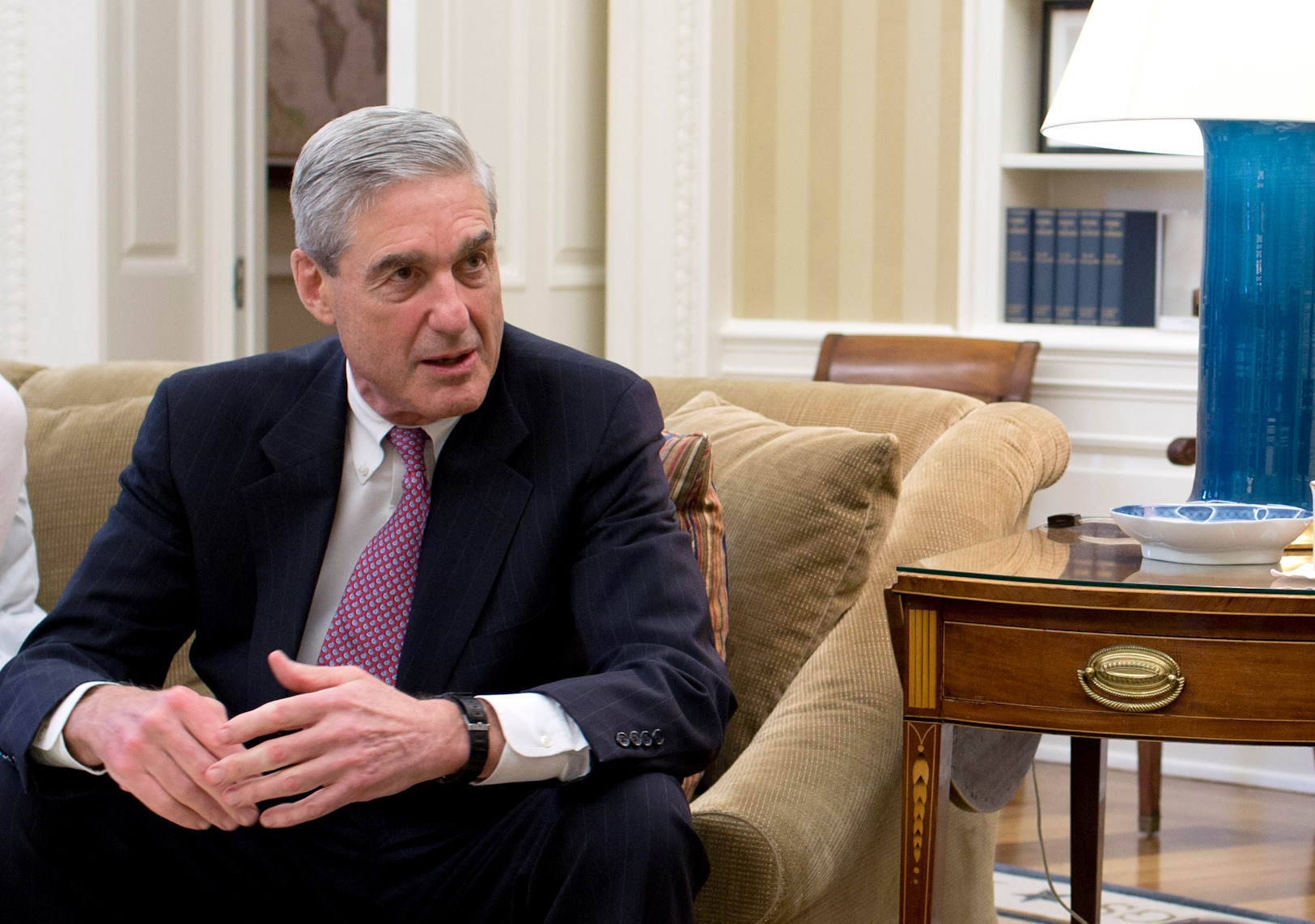A Note of Caution for Robert Mueller: The Attacks on the Special Counsel are Working
The announcement that three Trump campaign-connected figures have been prosecuted by Special Counsel Robert Mueller have captivated the D.C. press corps and elites. “Capitol Hill is Reeling,” reads a CNN headline. An NPR headline called it “A Day of Legal Shock and Awe.”

Published by The Lawfare Institute
in Cooperation With

The announcement that three Trump campaign-connected figures have been prosecuted by Special Counsel Robert Mueller have captivated the D.C. press corps and elites. “Capitol Hill is Reeling,” reads a CNN headline. An NPR headline called it “A Day of Legal Shock and Awe.”
But over the very weekend that generated this frenzy, we generated some data that should be of concern to the special prosecutor and those of us who want an objective investigation into Russian interference. As part of an ongoing polling project, from Oct. 25-31 we asked six public opinion questions concerning Mueller and foreign influence in U.S. politics using Google Surveys. The bottom line? The general public actually doesn’t trust Mueller all that much. The continuing attacks on him by the President’s allies and conservative media outlets seem to be taking a toll.
Here are the questions we asked:
- How much confidence do you have in Special Counsel Robert Mueller’s fairness and objectivity in investigating Russian influence in the 2016 election and related matters?
- How concerned are you about foreign influence in U.S. elections?
- How concerned are you about foreign influence in the U.S. political debate?
- Do you agree or disagree with the following statement? I believe that foreign government interference in a U.S. election is acceptable if it helps a candidate I support.
- Do you agree or disagree with the following statement? I believe that spreading inaccurate information is an acceptable tactic in a U.S. election if it helps a candidate I support.
- How severe do you believe the threat to be of Russia, or some other foreign power, hacking U.S. elections in the future?
The Public Doesn’t Trust Mueller
The first question, regarding Mueller, ran from October 25 to October 27, which was coincidentally the day that Mueller obtained the indictments from a grand jury but which preceded any announcement of charges. The results show that the public has low confidence in Mueller. In fact, 32 percent report having “no confidence” in Mueller on a scale ranging from 1 (“no confidence”) to 5 (“high confidence”). No confidence was by far, the modal response. When combined with respondents selecting 2 on this scale, more than 45 percent have low confidence in Mueller, compared to just 30 percent that have above average confidence in him (those selecting 4 and 5 on this scale). While other polls have found that Americans are sharply divided along partisan lines about the investigation into Russian influence in the 2016 election, we find this same general pattern of low confidence in Mueller holds across all age, gender, and regional sub-groups. Google Survey’s inferred demographics do not let us screen for party preference, registered voters, or likely voters.

Because this is the first time we we have run this question, we do not have comparison data since the Special Counsel’s appointment, so we don’t know whether Mueller’s standing has deteriorated or whether he was always mistrusted by a wide swath of the public. Nonetheless, we interpret this data pretty starkly: It suggests that the wide array of attempts by the President and his political allies to muddy the waters on Mueller’s objectivity are working. At a minimum, the President’s base has internalized the notion that Mueller is not a figure in whom they can place confidence. The data further suggest that a wider swath of the public is at least susceptible to that message. We find these results surprising and troubling. The widespread respect for Mueller’s objectivity that exists among politicians on both sides of the aisle and in the legal community simply does not seem to be shared by the public at large right now.
Another important caveat: we only ran this question about the Special Counsel, not about the Department of Justice, the Attorney General, the Congressional investigations, or even a question that would get to people’s trust in the veracity of the representations of President Trump and his campaign officials about their interactions with the Russians during the 2016 campaign. The result is that we do not know if confidence in the Special Counsel, as low as it is, is low or high relative to confidence in the other actors in the current drama.
At the very moment we published this post, the Washington Post released its own poll on confidence in Mueller, one with a strikingly different finding:
More than twice as many Americans approve as disapprove of special counsel Robert S. Mueller III’s investigation of possible coordination between Donald Trump’s 2016 campaign and the Russian government, a new Washington Post-ABC News poll finds, indicating that the conservative effort to discredit the probe has fallen flat as the case has progressed toward its first public charges.
A 58 percent majority say they approve of Mueller’s handling of the investigation while 28 percent say they disapprove, the Post-ABC poll finds. People’s views depend in large part on their political leanings, but overall, Americans are generally inclined to trust Mueller and the case he has made so far.
Meanwhile, fewer than 4 in 10 Americans say they believe Trump is cooperating with Mueller’s investigation, while about half believe he is not.
The poll was taken a few days after ours, between October 30 and November 1, and thus may well reflect respondents' reaction to the indictment and plea this week. In other words, the two surveys may be less inconsistent they are evocative of volatility in public opinion about the investigation. The difference could also reflect differences in the question itself or different survey methodologies between Google Surveys and the Washington Post/ABC pollsters.
We will run this question again next week to see whether the week of news surrounding the indictments has changed public perception. We will also include a series of questions about the other actors in the investigation, so we can compare the public’s relative confidence in them. It will be interesting to see whether the results show movement in the direction of the Washington Post/ABC finding.
The Public is Concerned about Foreign Influence
While the public may not have confidence in Mueller’s investigation of foreign influence, it is concerned about foreign influence in U.S. elections, specifically, and foreign influence in the U.S. political debate, generally. Roughly 45 percent of Americans have above average levels of concern (responding 4 or 5 on a scale of 1- “not concerned” to 5- “very concerned”) about foreign influence in U.S. elections. While “very concerned” is the modal response (30%), there is a strong polarity in responses with more than one in four respondents reporting being “not concerned” about foreign influence. Moreover, for our 2,353 male respondents, “not concerned” is the most common response, with nearly a third of men making this choice. Conversely, just 22 percent of women are not concerned about foreign influence in U.S. elections.
There are also important regional divides in concern about foreign influence in U.S. elections. For example, respondents in the more Democratic-leaning Northeast are nearly ten points more likely than respondents in the Republican-leaning South to report being “very concerned” about foreign influence in U.S. elections (36 pecent to 26 percent, respectively).

Widespread Opposition to Fake News and Foreign Influence
While concern about foreign influence may be lower than many in D.C. would expect, the public is unabashedly opposed to foreign influence in U.S. elections and the spreading of fake news, even if it is designed to help a candidate respondents support.
A majority of respondents (51 percent) “strongly disagree” with the statement “I believe that spreading inaccurate news is an acceptable tactic in a U.S. election if it helps a candidate I support.” And, a plurality (42 percent) “strongly disagree” with foreign interference if it helps a candidate they support. If respondents that just “disagree” with these statements are included, then more than seven in ten respondents oppose both foreign influence generally and the spreading of fake news specifically even if it would help their preferred candidate.

The Severe Threat of Attacks on Future Elections
Given the public’s strong opposition to foreign influence in U.S. elections, it’s perhaps unsurprising that the public thinks Russia, or some other foreign power, interfering in future U.S. elections is a real threat. Asked to rank the severity of this threat on a scale of 1 (“negligible”) to 5 (“very severe”), a plurality of respondents (29 percent) say it is a severe threat. Moreover, 47 percent of respondents say the threat is either a four or five (more severe) on this scale, compared to just 33 percent who say the threat is a one or two (more negligible).
This same pattern of perceiving foreign interference in U.S. elections as more of a severe threat holds across all age and geographic groups, though respondents in the Northeast and West regard the threat as more severe than do those in the South. However, there’s a large gender gap in perceptions of this threat. Men are just about as likely to say that a foreign power interfering in a U.S. election is more of a severe threat as they are to say it’s more of a negligible threat (42 percent to 41 percent, respectively). Women, on the other hand, are twice as likely to say foreign interference in U.S. elections is more of a severe threat (52 percent) than they are to say it’s more of a negligible threat (25 percent).

These results, taken together with our results from late August that the public overwhelmingly finds little similarity between America’s interests and Russia’s interests, suggests that the public is not looking favorably upon those who would have worked with Russia to swing the election.








